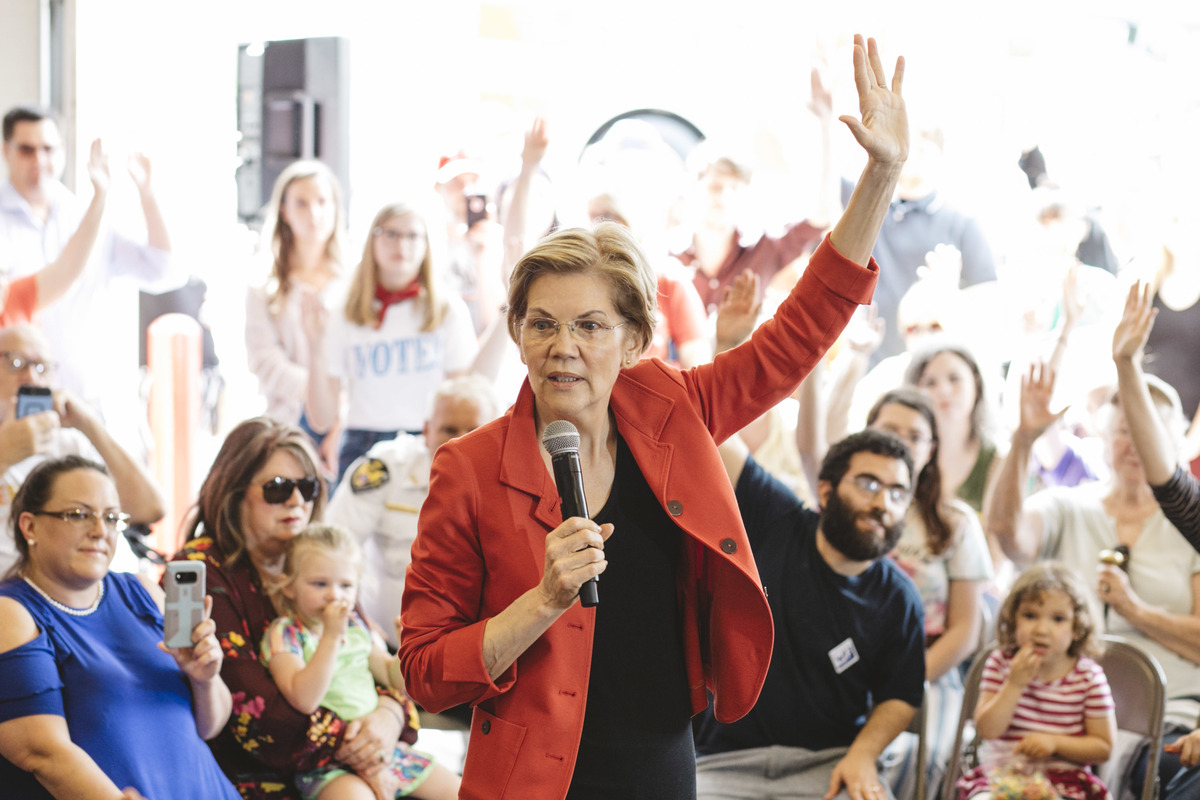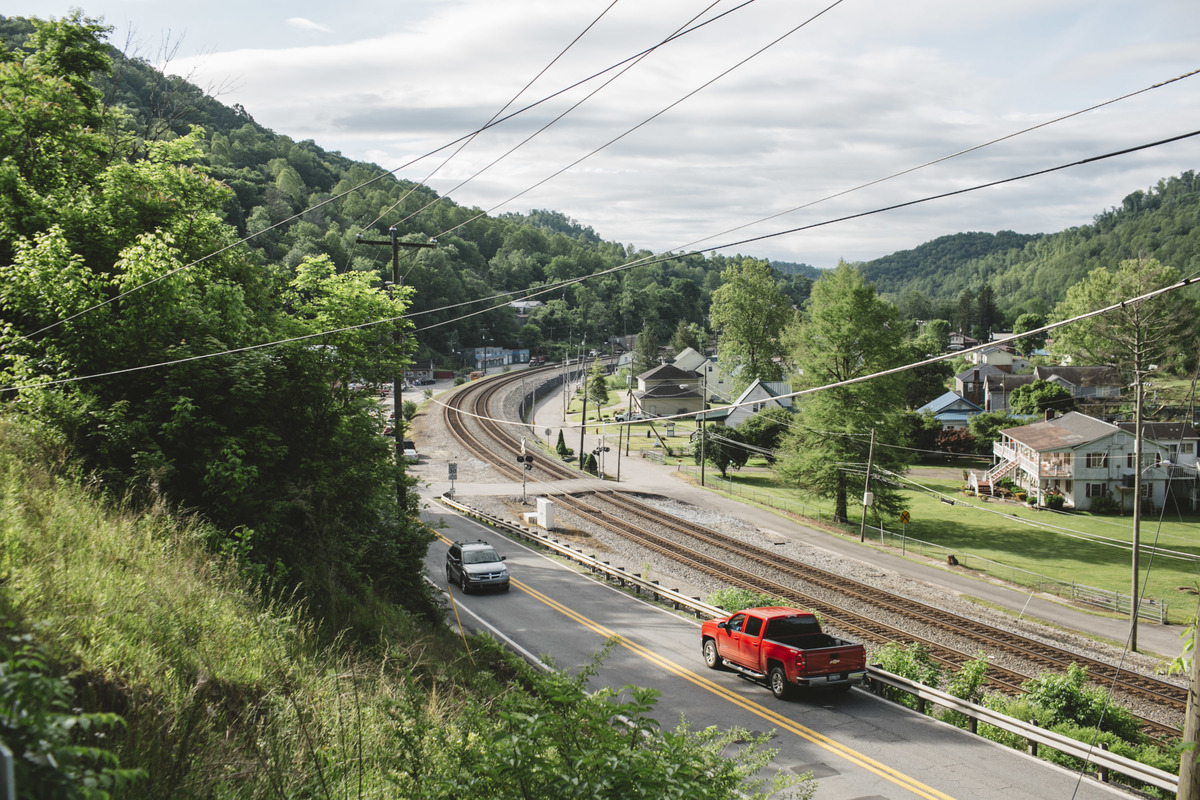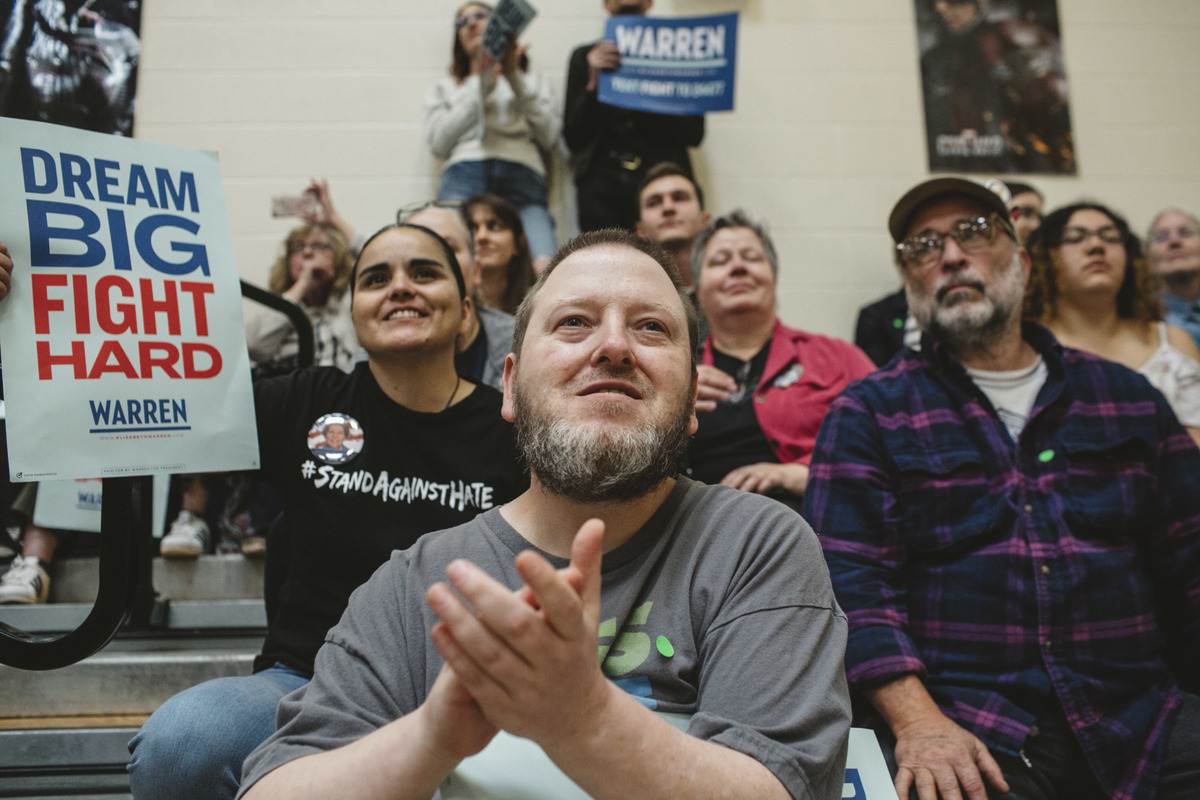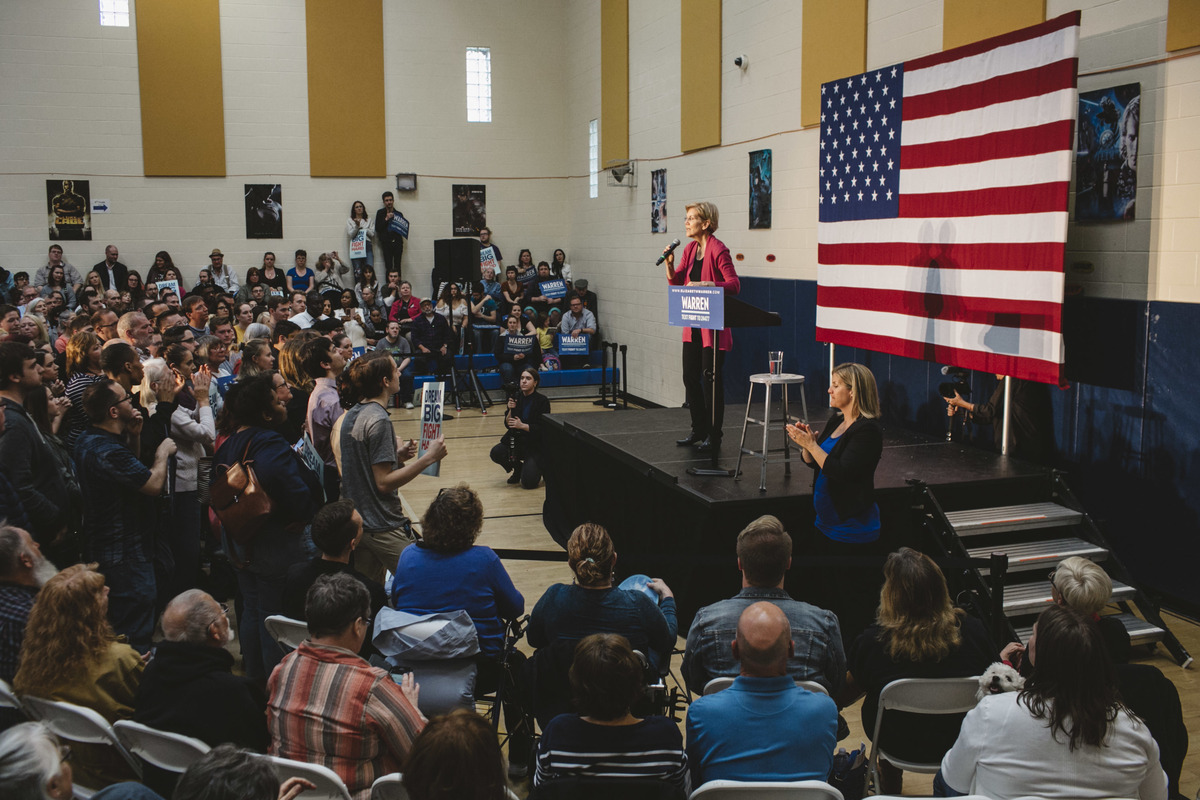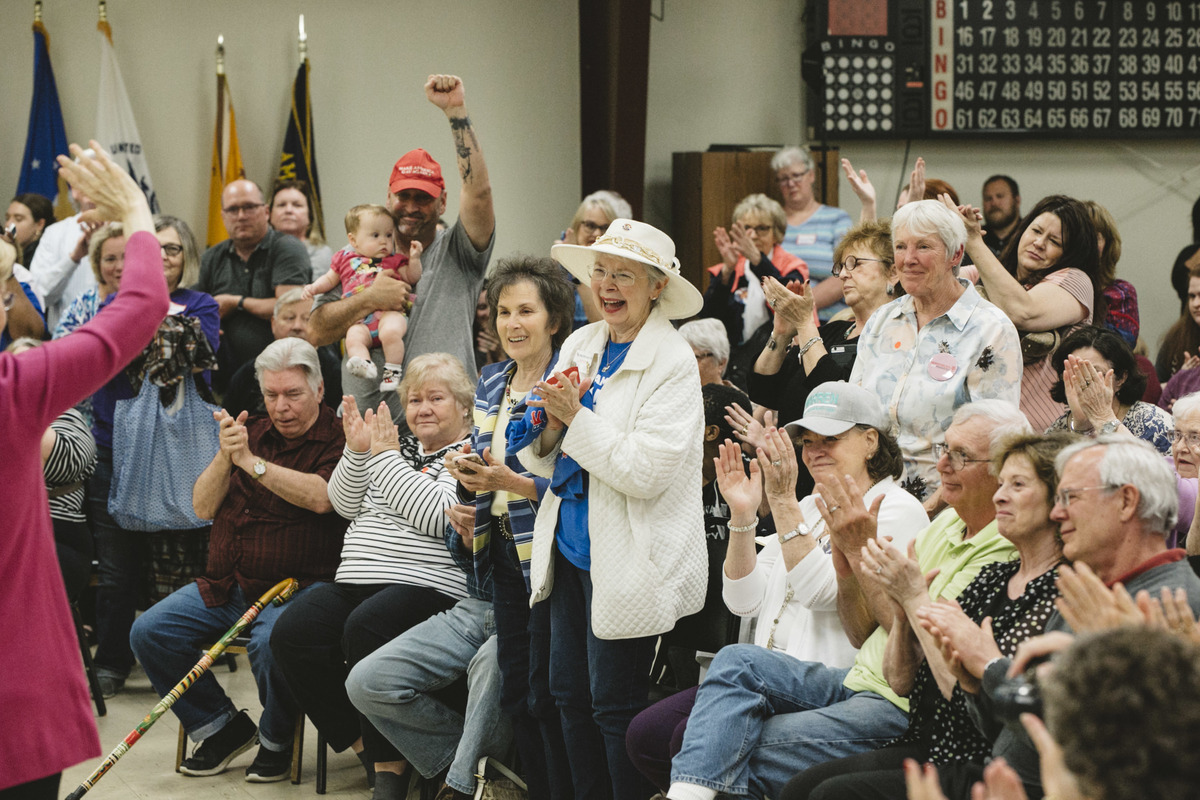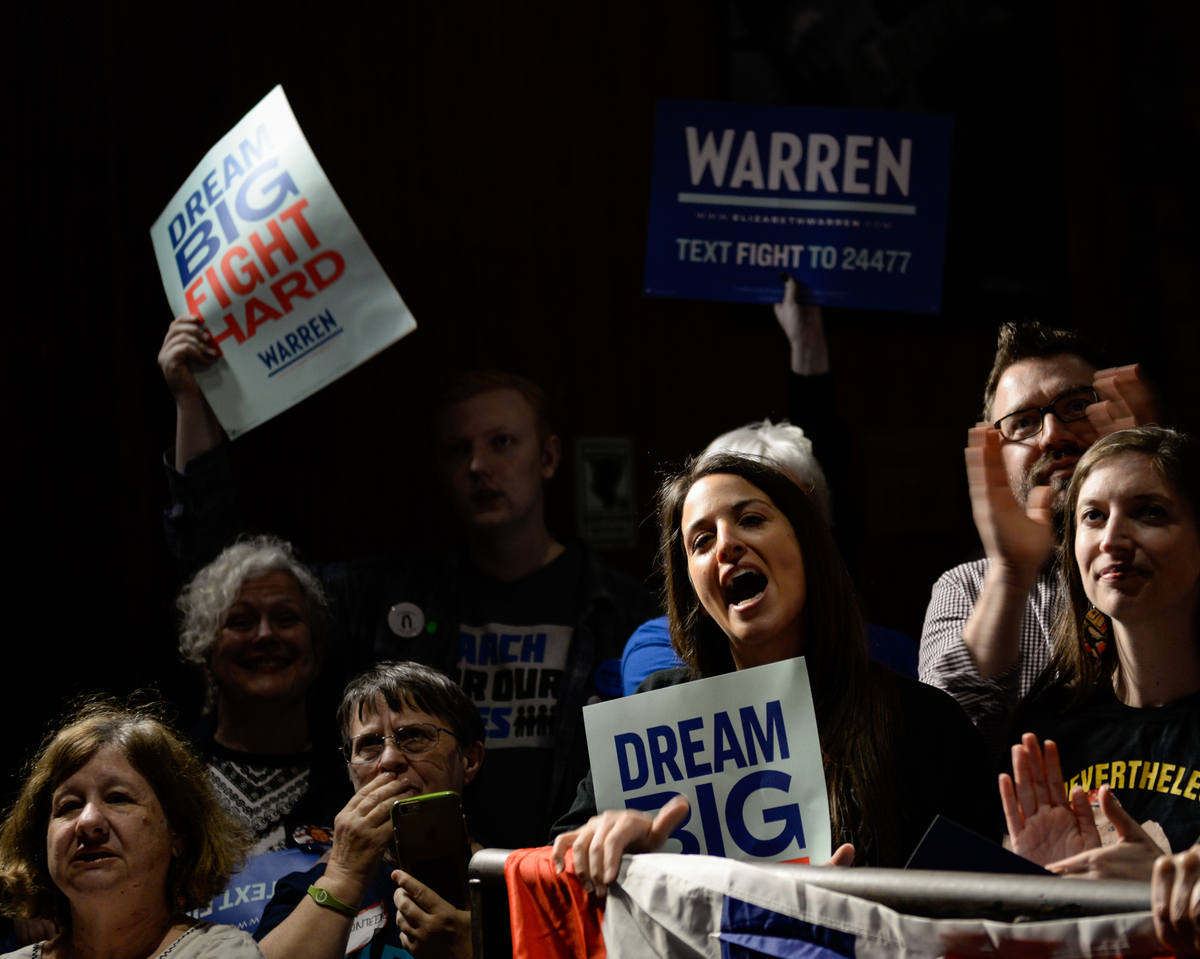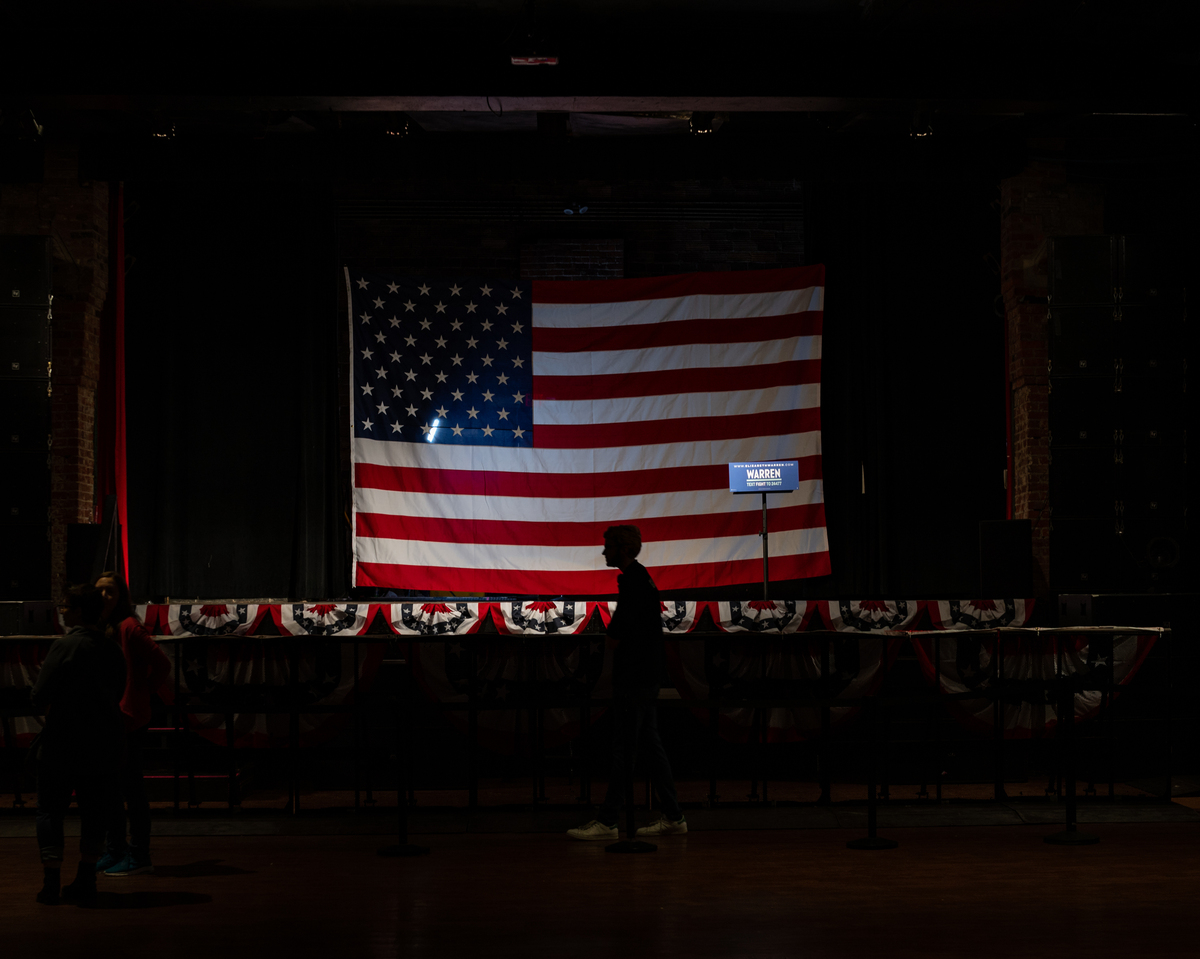
Elizabeth Warren at a campaign stop at the fire department in Kermit, W.V., on May 10, 2019. Kermit has a population of about 400 and has allegedly only been visited by one other presidential candidate, John F. Kennedy. Warren went on to campaign in the rural southern Ohio town of Chillicothe, before ending the day in Columbus.
Andrew Spear for NPR
hide caption
toggle caption
Andrew Spear for NPR
Elizabeth Warren at a campaign stop at the fire department in Kermit, W.V., on May 10, 2019. Kermit has a population of about 400 and has allegedly only been visited by one other presidential candidate, John F. Kennedy. Warren went on to campaign in the rural southern Ohio town of Chillicothe, before ending the day in Columbus.
Andrew Spear for NPR
A West Virginia town of fewer than 400 people isn’t an obvious place for a progressive Democrat to campaign for president. But nevertheless, there was Elizabeth Warren rallying her supporters in the town of Kermit on Friday.
Warren spoke to a small crowd in the town firehouse about the opioid crisis, while Trump supporters demonstrated by the highway just outside.
“It’s time to talk about personal responsibility, and that means the people who helped create this problem. And I’ve got a plan for that,” Warren said, to loud cheers.
Kermit has been hit hard by that crisis, and the Massachusetts senator spent a lot of her Friday speech talking about her $100 billion plan to combat that epidemic, which she and Maryland Rep. Elijah Cummings released last week.

Downtown Kermit, W.V., before an Elizabeth Warren campaign stop at the fire department.
Andrew Spear for NPR
hide caption
toggle caption
Andrew Spear for NPR
Downtown Kermit, W.V., before an Elizabeth Warren campaign stop at the fire department.
Andrew Spear for NPR

The crowd at an Elizabeth Warren campaign stop at an elementary school in Columbus, Ohio, on May 10, 2019. Earlier in the day, Warren stopped in Kermit, W.V., before going onto Chillicothe. At each stop, Warren spoke extensively about the opioid crisis and how its affected each of the places she visited.
Andrew Spear for NPR
hide caption
toggle caption
Andrew Spear for NPR
The crowd at an Elizabeth Warren campaign stop at an elementary school in Columbus, Ohio, on May 10, 2019. Earlier in the day, Warren stopped in Kermit, W.V., before going onto Chillicothe. At each stop, Warren spoke extensively about the opioid crisis and how its affected each of the places she visited.
Andrew Spear for NPR
“I want to make a point here. It’s not just money that Washington is going to figure out how to do it,” she said. “The whole point of this is to push this money down into the communities that are on the front lines dealing with this problem.”
This was a message Warren was trying to send: that she’s serious about addressing problems. But the trip was a part of a bigger attempt to introduce herself both as a candidate — even in places where Democrats are scarce — and as a person, in a primary where better-known personalities are dominating.
A plan for just about everything
Having proposals is Warren’s brand. After focusing on opioids in Kermit and later in Chillicothe, Ohio, Warren pitched voters on several other ideas: a tax on the uber-wealthy, student debt cancellation and universal child care, for example.
That library of policy proposals is drawing in some voters.
“The big one that I’m hearing a lot of press about, that affects a lot of people, is college loan forgiveness,” said Rebecca Hooker, a Kermit resident. “I’m 53 years old, went back and completed my degree, and now I’m struggling with college debt.”
Warren’s plans don’t just show her faculties with policy specifics; for some voters, the plans’ very existence sends a message.

Warren speaks to a large crowd at a campaign stop at an elementary school in Columbus, Ohio.
Andrew Spear for NPR
hide caption
toggle caption
Andrew Spear for NPR
Warren speaks to a large crowd at a campaign stop at an elementary school in Columbus, Ohio.
Andrew Spear for NPR
“I know she’s not bulls****ing — plain and simple,” said Patricia Casserly, who went to see Warren speak in Columbus, Ohio. “She’s got follow-through. You know, a lot of them say a lot, but they don’t do much.”
But going to Columbus isn’t just about energizing people like Casserly. These days, polls show Warren well behind the familiar names of Joe Biden and Bernie Sanders.
Around 1 in 4 Democratic primary voters either have never heard of or have no opinion of Warren, according to polling firm Morning Consult — so a trip through Ohio also gets her that much more exposure.
“Columbus, for instance, is larger than Boston and Baltimore and Washington D.C.,” said Chris Redfern, former chairman of the Ohio Democratic Party.
“She knows she’s going to be on the front page of the newspaper leading all of the telecasts,” he added. “It’s going to give her a chance to speak out and give voters a chance to compare her ideas with Joe Biden, who is a very attractive candidate in Ohio as well.”
Trying to be “one of us”

Doris Adams, center, cheered at an Elizabeth Warren campaign stop at the AMVETS veterans post in Chillicothe, Ohio, on May 10, 2019. Chillicothe is a rural town in southern Ohio.
Andrew Spear for NPR
hide caption
toggle caption
Andrew Spear for NPR
Doris Adams, center, cheered at an Elizabeth Warren campaign stop at the AMVETS veterans post in Chillicothe, Ohio, on May 10, 2019. Chillicothe is a rural town in southern Ohio.
Andrew Spear for NPR
In this Democratic presidential field, Warren is often put in the progressive lane with Bernie Sanders. And while they both have liberal-populist messages, they pitch them very differently on the trail. Sanders’ campaign speech is largely about the state of the economy and what he sees as the way to fix it, but he keeps himself out of it.
Warren, meanwhile, leans heavily on her biography. For being The Woman With A Plan, she spends a lot of her stump speech talking about her life before she became a Harvard law professor, consumer advocate and, eventually, a senator.
In one section, she talks about her circuitous career route, which started with getting a college scholarship, falling in love at age 19, getting married and dropping out of school. It’s a section of her speech she punctuates with pauses, allowing the crowd to cheer, laugh, or alternately groan, as she enumerates each step in the story.

The crowd at an Elizabeth Warren campaign stop at Cincinnati’s town hall.
John-David Richardson for NPR
hide caption
toggle caption
John-David Richardson for NPR
The crowd at an Elizabeth Warren campaign stop at Cincinnati’s town hall.
John-David Richardson for NPR
It’s a story that seems tailor-made to make the avowed policy wonk more relatable to voters. And for some, it works.
“She’s real. She tells things like they are. She’s just, like, one of us. She doesn’t try to put on a show,” said Sharon Wagner, a retired schoolteacher who saw Warren in Chillicothe.
But then, Wagner is an example of one of the biggest hurdles Warren faces, in that Wagner admires Warren but isn’t settled on her, among so many Democrats vying to take on President Trump.
And there’s a pattern there. In interviews with 16 voters across four events, the overwhelming majority — including all the voters represented in this story — weren’t decided that they are backing Warren.
Deborah Stanton, who stood in line to see Warren in Cincinnati, was one of those voters. “I think she’s a very strong candidate. She has been for years. I’m just glad she decided to run,” she said.
And yet, when asked who her top choice is, she answered: “I’m more leaning towards Biden.”

Staff prepares for Sen. Elizabeth Warren’s town hall event in Cincinnati.
John-David Richardson for NPR
hide caption
toggle caption
John-David Richardson for NPR
Staff prepares for Sen. Elizabeth Warren’s town hall event in Cincinnati.
John-David Richardson for NPR
It’s not a scientific poll, but it does suggest an important concern for Warren, and perhaps some of her rivals as well: There’s a difference between a voter being enthusiastic enough to attend a campaign event and being enthusiastic enough to pick you over 20 other candidates.
Article source: https://www.npr.org/2019/05/14/722874690/elizabeth-warren-has-a-plan-to-get-personal-with-voters?utm_medium=RSS&utm_campaign=news
